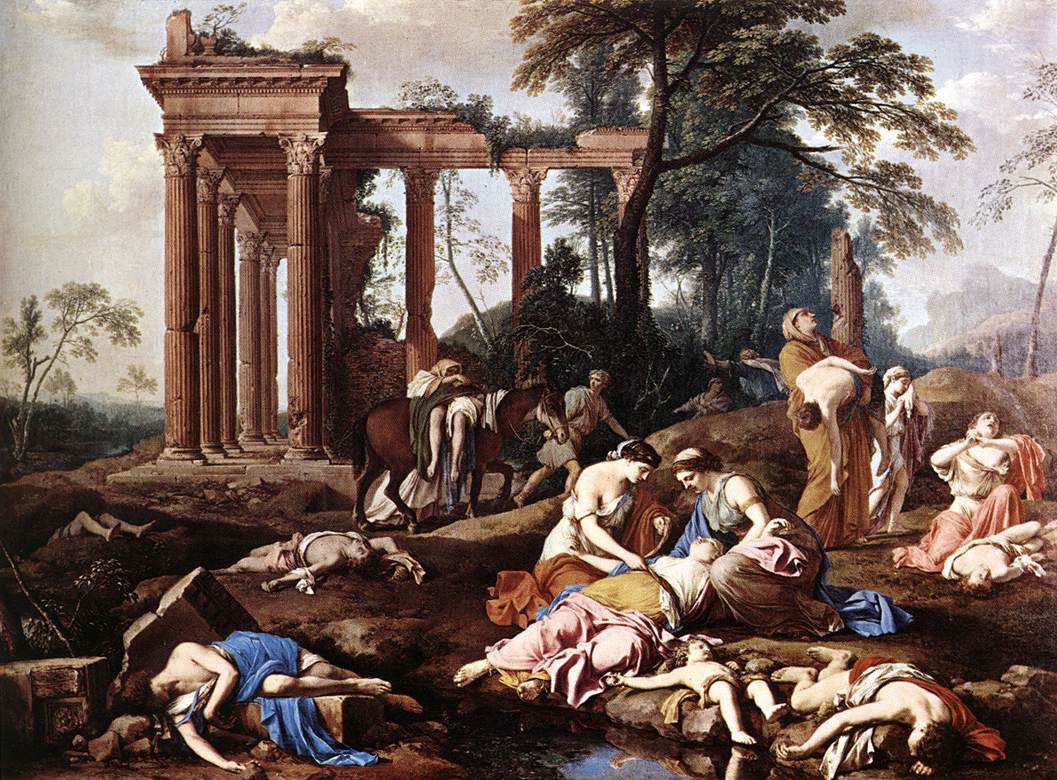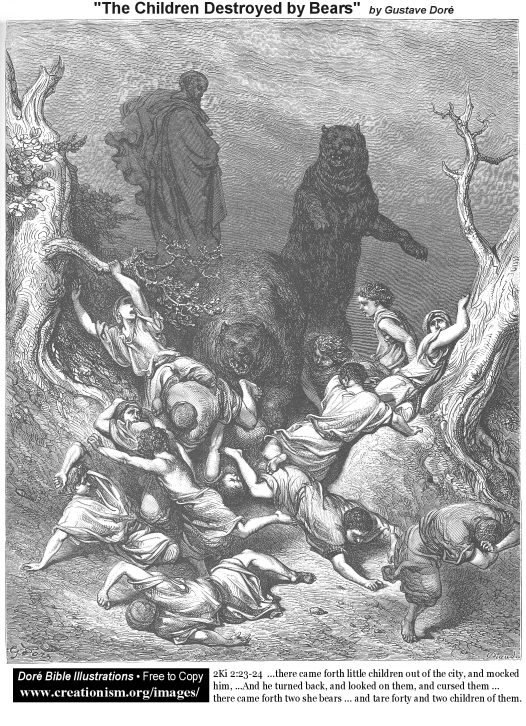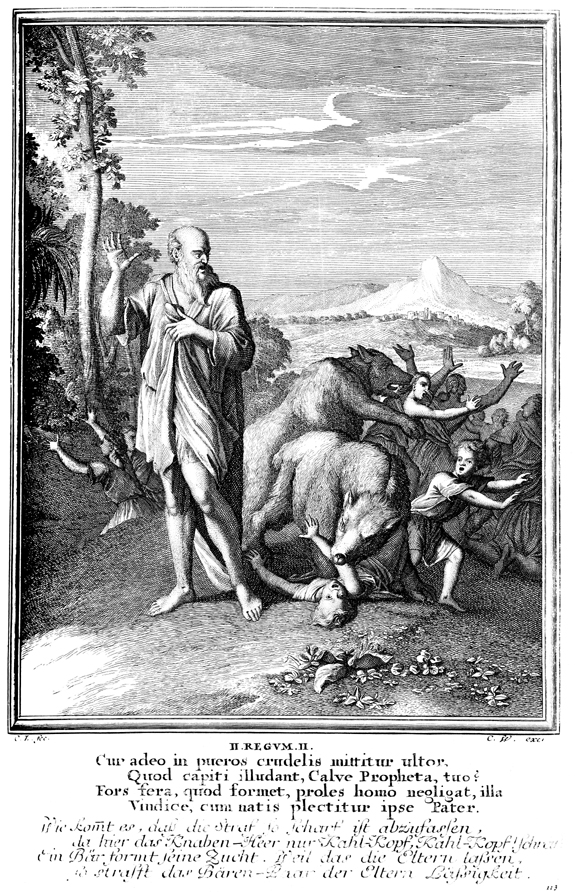創造論ネタ
次の絵は、42人の子供たちの死体と、それを嘆く母親たちを描いた1653年のla Hireの作品である。
その原因は、一人のハゲである。
あんまりなので、言い訳を考える人々もいるようだ。まずは「小さな子どもではない」から:
しかし、おそらく、"誤訳"だという主張は間違っている:
次の絵は、42人の子供たちの死体と、それを嘆く母親たちを描いた1653年のla Hireの作品である。
しかし、この嘆きは神には決して通じない。何故なら、これは神が二頭の熊に子供たちを襲わせた結果だから。
Laurent de LA HIRE(1606-1656):"The Children of Bethel Mourned by their Mothers"(1653) at Palais Saint-Vaast, Arras
その原因は、一人のハゲである。
[19]この町の人々はエリシャのところに来て、「御覧のように、この町は住むには良いのですが、水が悪く、土地は不毛です」と訴えた。小さい子供たちの行動は褒められたものではないかもしれないが、死を以って贖うべきものとは思えない。
[20]彼は、「新しい器を持って来て、それに塩を入れなさい」と命じた。人々が持って来ると、
[21]彼は水の源に出かけて行って塩を投げ込み、「主はこう言われる。『わたしはこの水を清めた。もはやここから死も不毛も起こらない』」と言った。
[22]エリシャの告げた言葉のとおり、水は清くなって今日に至っている。
[23]エリシャはそこからベテルに上った。彼が道を上って行くと、町から小さい子供たちが出て来て彼を嘲り、「はげ頭、上って行け。はげ頭、上って行け」と言った。
[24]エリシャが振り向いてにらみつけ、主の名によって彼らを呪うと、森の中から二頭の熊が現れ、子供たちのうちの四十二人を引き裂いた。
[25]エリシャはそこからカルメル山に行き、そこからサマリアに帰った。
[列王記下 2章 19-25節 (日本聖書協会新共同訳)]
あんまりなので、言い訳を考える人々もいるようだ。まずは「小さな子どもではない」から:
"Little children" is an unfortunate translation, raising quite a wrong idea of the tender age of the persons spoken of. On the other hand, Bishop Patrick is assertion that the words are to be 'understood of adult persons, who had a hatred to the prophet,' is quite untenable. Naarim ketanaim would be best translated (as by our Revisers in the margin) ‘young lads'--boys, that is, from twelve to fifteen. Such mischievous youths are among the chief nuisances of Oriental towns; they waylay the traveler, deride him, jeer him--are keen to remark any personal defect that he might have, and merciless in flouting it; they dog his steps, shout out their rude remarks and sometimes proceed from abusive words to violent acts, as the throwing of sticks, or stones, or mud. On this occasion they only got as far as rude words.これでも足りないと思う人々もいて、さらに踏み込んだことを言う人々もいる:
「小さな子ども」は不幸な誤訳である。これは話に登場する人々の年齢について間違った考えを抱かせる。一方、Patrick司教の「預言者を憎悪する成人として理解される」という主張も根拠がない。許容範囲内の校正として、「12〜15歳の若者」という Naarim ketanaimの訳が最良の訳である。そのようないたずら好きな若者は、東方の町の迷惑なもののひとつである。彼らは旅行者を待ち伏せて、馬鹿にして、あざける。彼らは、旅人の持つ障害を何だってあげつらい、情け容赦ない。彼らは、旅人の後を追って、大声で粗野な言葉を吐きかけ、棒や石や泥を投げつけ、口汚く罵る。そのとき彼らは思いきり粗野だ。
G. Rawlinson, II Kings, The Pulpit Commentary, ed. H.D. M. Spence and Joseph S.Exell (New York: Funk and Wagnals, n.d.), p.23, quoted by RICHARD G. MESSNER
A careful study of this incident in context shows that it was far more serious than a "mild personal offense." It was a situation of serious public danger, quite as grave as the large youth gangs that roam the ghetto sections of our modern American cities. If these young hoodlums were ranging about in packs of fifty or more, derisive towards respectable adults and ready to mock even a well-known man of God, there is no telling what violence they might have inflicted on the citizenry of the religious center of the kingdom of Israel (as Bethel was), had they been allowed to continue their riotous course.聖書は無謬だという立場をとる"若い地球の創造論"者たちも言い訳を必要としている。たとえば、創造科学の父たるDr. Henry M. Morrisは次のように書いている:
前後関係の中でのこの事件についての慎重な研究で、「軽い個人的不快感」よりもはるかに深刻だったことが示された。これは、現代の米国の都市における若いギャングと同じくらい重大な治安問題だった。50人以上のチンピラがたむろしていて、いつても、有名な聖人であろうとも立派な大人たちをあざけりかねず、ベテルのようなイスラエル王国の宗教的中心都市の住民たちに暴力をふるうやもしれず、そのままいけば暴動へとつながりかねなかった。
...
Perhaps it was for this reason that God saw fit to put forty-two of them to death in this spectacular fashion (there is no evidence that Elisha himself, in imposing a curse, prayed for this specific mode of punishment), in order to strike terror into other youth gangs that were infesting the city and to make them realize that neither Yahweh Himself nor any of His anointed prophets were to be threatened or treated with contempt.
おそらく、神が彼らのうち42人をあのような形で死なせたのは、それによって、チンピラたち恐怖をたたき込み、ヤウェ自身にも、ヤウェに油を塗られた預言者たちをも脅かしたり、軽蔑したりしないようにするためである。エリシャが懲罰方法を祈って、呪をかけたという証拠はない。
Gleason L. Archer: "Encyclopedia of Bible Difficulties", Zondervan: 1982, quoted by Christian-thinktank
The fact is, however, that Elisha did not curse little children at all. The Hebrew word for "children" used with the phrase "little children" can be applied to any child from infancy to adolescence. The word for the 42 "children" torn by the bears, however, is a different word, commonly translated "young men." Actually, both words are used more often for young men than for little children.若い地球の創造論ミニストリAnswers in Genesisも同様の立場を主張している。
しかし、事実はエリシャは小さな子どもたちを呪ってはいない。「小さな子ども」のフレーズで使われている、ヘブル語の「子供」という単語は、幼児から青年までに使われる。「42人の子供たちがクマによって引き裂かれた」は青年と訳される。実際、これらの言葉は、小さな子どもよりも青年に対して使われれる。
The situation evidently involved a gang of young hoodlums of various ages, led by the older ones, with all of them no doubt instigated by the pagan priests and idolatrous citizens of Bethel. The bears which suddenly emerged from the woods "tare" (not necessarily fatally in all cases) 42 of the older hooligans.
状況は明らかに間違いなく、ベセルの異教徒の聖職者と偶像を崇拝する市民によって扇動された、年長者に率いられた様々年齢の若いチンピラのギャングが関係していた。突然森から出てきたクマは、年長のフーリガンのうちの42人を引き裂いたが、それらすべてが致命傷だったとは限らない。
The jeering exhortation to "go up, thou bald head," was both a sarcastic reference to Elijah’s supposed ascension, as well as an insult to God’s prophet. This was actually a challenge to God and could not be excused. So God made good―in miniature―on a warning issued long before: "And if ye walk contrary unto me. . . . I will also send wild beasts among you, which shall rob you of your children" (Leviticus 26:21,22). It can be a dangerous thing, for young or old, to gratuitously insult the true God and His word.
「はげ頭、上って行け。」という嘲りは、エリヤの昇天への皮肉であるとともに、神の預言に対する攻撃である。これはまさに神への挑戦であって、言い訳できない。神は、はるか以前に警告をしている。「それでも、まだわたしに反抗し、わたしの言葉を聞こうとしないならば、あなたたちの罪に七倍の災いを加える。わたしはあなたたちの間に野獣を放つ。野獣はあなたたちの子供を奪い取り、家畜を滅ぼし、あなたたちの数を減らす。こうして街道は荒れ果てる。 」(レビ記26章21-22節) 神と神の言葉への侮辱は、年齢によらず、危険なものである。
Henry M. Morris: "Elisha's Bears" (1997) on Institute for Creation Research
しかし、おそらく、"誤訳"だという主張は間違っている:
The Hebrew words "na'ar qatan" are used for "little children". The word used for "children" is na'ar, which the Strong's Concordance defines as: "(concretely) a boy from the age of infancy to adolescence...also, (by interchangeable of sex), a girl (of similar latitude in age)". The word for "little" is qatan, which Strong's defines as "diminutive, literally (in quantity, size or number), or figuratively (in age or importance)." What this means is that the Hebrew words used in the original bible verses, "na'ar qatan" absolutely, positively mean "little children".なので、「子供たちとハゲの老人であるエリシャ」という絵画の表現そのまま:
へブル語の「na'ar qatan」は「小さな子どもたち」の意味で使われる。「子供たち」に対応するのが「na'ar」である。これは「幼児から青年までの少年(性別を問わない)、同年齢の少女」というStrong's Concordanceの定義である。「小さな」に対応するのは「qatan」である。Strong's Concordanceは「文字通り量や大きさや数字、あるいは比ゆ的に年齢や重要性」と定義している。これが意味するところは、ヘブル語の聖書で使われている「na'ar qatan」は「小さな子どもたち」を意味している。
What's So Bad About Killing Children? (2004) (also in Iron Chariots Wiki: Elisha)
Gustave Doré (1832-1883): "The Children Destroyed by Bears" from "Bible Illustrations" on Creationism.Org
(出典不明)via Lobojo's Den





コメントをかく